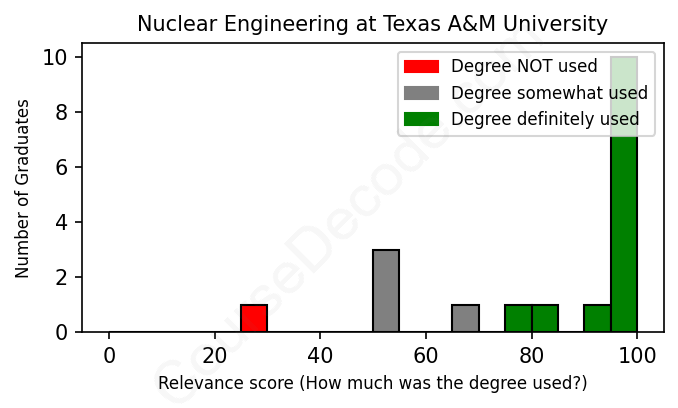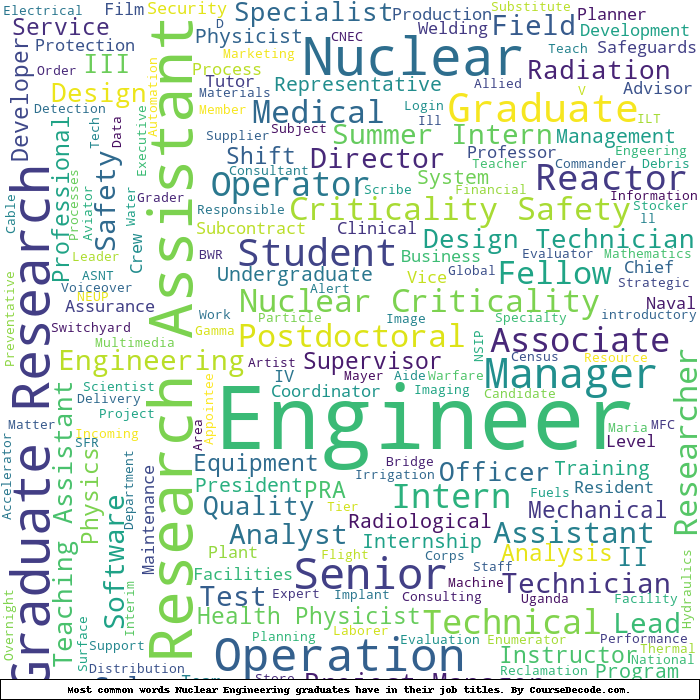
First, some facts. Of the Nuclear Engineering graduates from Texas A&M University we've analyzed , here's how many have used (or NOT used) their degree in their career:

These are estimates based on AI analysis of 18 LinkedIn profiles (see below).
The verdict? Significantly above average. Overall, with an average relevance score of 83%, Nuclear Engineering graduates from Texas A&M University have a much higher likelihood (+16%) of finding work in this field compared to the average graduate across all fields:
And for comparison, here's the chart for all profiles we've looked at across all degrees.
Also, after graduating, only 27% of these graduates have pursued further education other than another Bachelor's degree (such as a Masters degree or other), compared to the average across all profiles of 35%. This suggests a Bachelors degree is enough for most Nuclear Engineering graduates, and it's normal to look for work straight after graduation.
See the details:
|
Relevance score: 100% We think this person has gone into a career highly relevant to their degree. We think this person has gone into a career highly relevant to their degree.
DEGREE INFOGraduated in 2023 from Texas A&M University with a Bachelor of Science - BS in Nuclear Engineering. No other secondary education since. JOB HISTORY SINCE GRADUATIONEngineer in Training for the Nuclear Fuels & Analysis Department STP Nuclear Operating Company Jun 2023 - Present ABOUTHowdy, my name is [NAME REMOVED] Oka. I was born and raised in Spring Texas. I received my BS in Nuclear Engineering at Texas A&M class of 2023. Im currently working for STP as a Engineering in training in the Nuclear Fuel & Analysis Department. |
The top 10 most common jobs done by the graduates we've analyzed (ranked most common to least) are:
From analyzing the LinkedIn profiles of Texas A&M University graduates with a degree in Nuclear Engineering, it's clear that many of them have landed jobs that are closely tied to their field. The most common roles include Nuclear Criticality Safety Engineers, Reactor Operators, and various research and engineering positions at notable companies and laboratories like Los Alamos National Laboratory and Exelon Nuclear. These positions leverage their nuclear engineering training directly and often stem from the core principles they learned during their studies. For instance, roles such as Nuclear Criticality Safety Engineers at CONSOLIDATED NUCLEAR SECURITY, LLC show a strong relevance, as criticality safety is a specialized area within nuclear engineering. Similarly, reactor operators apply the technical knowledge obtained through their degree in real-world plant operations.
However, it's also interesting to note that not all graduates remain within the nuclear engineering bubble. Some have ventured into engineering roles that might only loosely connect to their degree, such as positions in quality assurance at BAE Systems, where the nuclear engineering knowledge may not be the primary focus of day-to-day responsibilities. In addition, there are instances of graduates taking up non-engineering jobs, like the Pit Master role, which clearly strays far from their academic training. Overall, while many graduates find relevant and exciting roles in the nuclear field, a surprisingly notable portion veers off into areas less directly related to nuclear engineering, showcasing the versatility of their engineering skills. To sum it up, Texas A&M graduates in this field have a diverse career path, predominantly aligned with nuclear engineering, but with some exploring other avenues along the way.
Here is a visual representation of the most common words in job titles for Nuclear Engineering graduates (this is across all Nuclear Engineering graduates we've analyzed, not just those who went to Texas A&M University):

When you look at the careers of graduates from Texas A&M University's Nuclear Engineering program, it's pretty clear that they're landing solid roles right out of school. Many of them kick-start their careers with jobs related to nuclear safety or plant operations, which makes sense given their educational background. For instance, graduates from the class of 2010 often found themselves in nuclear criticality safety roles immediately after graduation, and some still hold similar positions years later, like at CONSOLIDATED NUCLEAR SECURITY, LLC. Those who graduated in 2013 seem to stick with major players in the nuclear energy field, such as Exelon Nuclear, where they advance from associate roles to senior operator positions over the years. It shows a clear progression in responsibility and expertise, aligned with their studies.
As you dive deeper into the first five years post-graduation, many of these graduates seem to be on a strong, upward path within the nuclear field. By around five years after graduation, they're often moving into more senior positions or specialized roles, such as health physicist or reactor engineer, at reputable organizations. A few, like the class of 2019 folks, have even ventured into quality engineering and research roles at notable companies like BAE Systems or the U.S. Nuclear Regulatory Commission. It’s a mixed bag for newer graduates, with some venturing into non-traditional roles (like a "Pit Master" at a barbecue joint), but overall, it seems that most are on track for fulfilling careers related to nuclear engineering, with many staying engaged in research or operational sectors of the industry as they gain experience and expertise.
Getting a Bachelor’s degree in Nuclear Engineering, especially at a reputable place like Texas A&M, isn’t a walk in the park—it's typically considered one of the tougher engineering disciplines. You'll be diving deep into subjects like thermodynamics, fluid mechanics, and radiation physics, which can get pretty complex. The coursework often requires a strong foundation in math and science, so if you’re not super comfortable with those, it might feel even more challenging. Group projects and labs can be intense too, adding to the workload and the stress. Overall, it’s definitely more demanding than a typical degree, but if you’re passionate about it, you might find the challenge exciting! Just be prepared to put in some serious effort!
Most commonly, in the LinkedIn profiles we've looked at, it takes people 4 years to finish a Bachelor degree in Nuclear Engineering.
Looking at these Nuclear Engineering graduates from Texas A&M, it seems like they've generally scored some solid jobs that likely pay pretty decently, especially considering the field they’re in. The first grad, for instance, climbed the ladder to manager and is still with a prominent company, which probably means they’re making good money now. The others are working in various capacities within the nuclear sector and seem to be progressing in their careers, like moving from technician positions to more specialized roles. Even those who graduated more recently have jumped into roles like Engineer or Research Assistant at reputable labs or companies, which usually come with a decent paycheck. So all in all, it looks like they’ve got a bright financial future ahead of them!
Here is a visual representation of the most common words seen in the "about" section of LinkedIn profiles who have a Bachelor degree in Nuclear Engineering (this is across all Nuclear Engineering graduates we've analyzed, not just those who went to Texas A&M University). This may or may not be useful:

Here are all colleges offering a Bachelor degree in Nuclear Engineering (ordered by the average relevance score of their Nuclear Engineering graduates, best to worst) where we have analyzed at least 10 of their graduates:
| College | Score | Count |
|---|---|---|
 Texas A&M University Texas A&M University
|
83 | 18 |